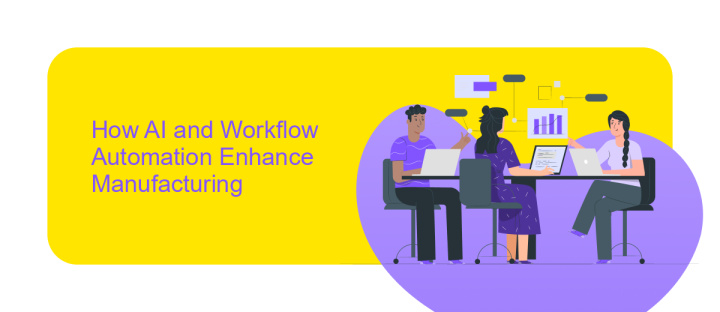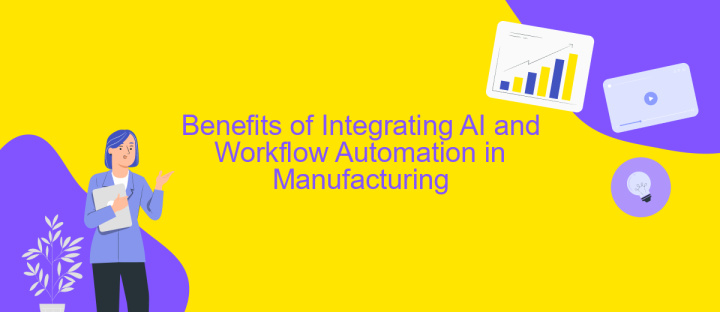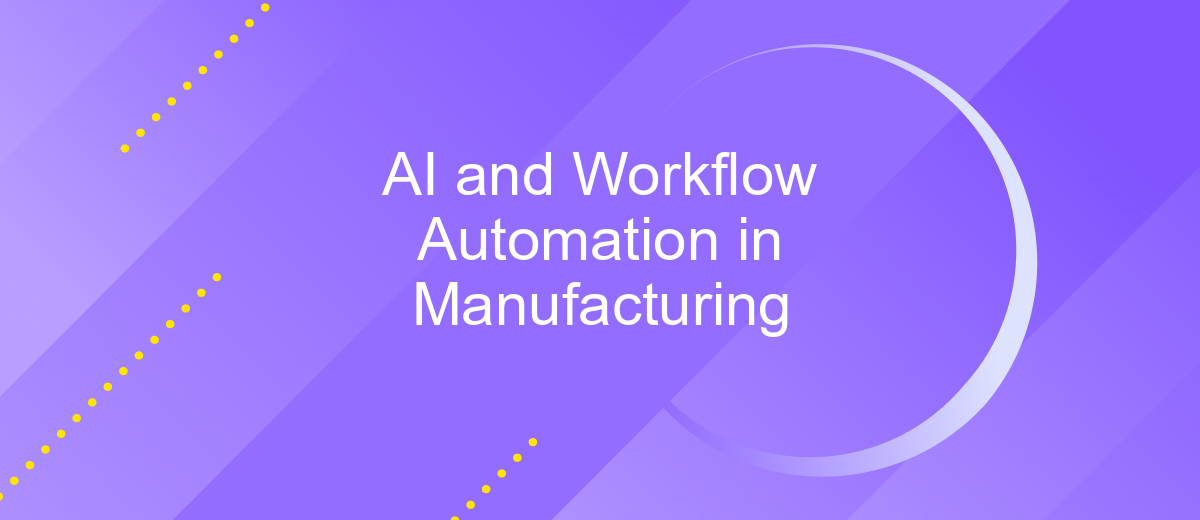AI and Workflow Automation in Manufacturing
In today's rapidly evolving manufacturing landscape, the integration of Artificial Intelligence (AI) and workflow automation is revolutionizing production processes. By leveraging advanced algorithms and automated systems, manufacturers can enhance efficiency, reduce errors, and streamline operations. This synergy not only drives cost savings but also fosters innovation, positioning companies to stay competitive in a dynamic market.
Introduction
In recent years, the manufacturing industry has witnessed a significant transformation, driven by the integration of Artificial Intelligence (AI) and workflow automation. These advancements have not only enhanced productivity but also revolutionized the way manufacturing processes are managed and executed. AI-powered systems and automation tools are now at the forefront of this industrial evolution, offering unprecedented efficiency and precision.
- Improved operational efficiency through real-time monitoring and predictive maintenance.
- Enhanced product quality and reduced error rates with AI-driven quality control.
- Streamlined supply chain management and inventory optimization.
- Increased flexibility and adaptability in production lines.
One of the key enablers of this transformation is the seamless integration of various systems and processes. Services like ApiX-Drive play a crucial role in facilitating these integrations, allowing manufacturers to connect disparate tools and automate workflows effortlessly. By leveraging such services, manufacturers can ensure smooth data flow and coordination across different stages of production, ultimately leading to more efficient and agile operations.
How AI and Workflow Automation Enhance Manufacturing

Artificial Intelligence (AI) and workflow automation are revolutionizing the manufacturing industry by streamlining processes and increasing efficiency. AI algorithms can analyze vast amounts of data in real-time, enabling predictive maintenance and reducing downtime. Machine learning models optimize production schedules, ensuring that resources are used efficiently and waste is minimized. These advancements lead to higher productivity and lower operational costs, giving manufacturers a competitive edge in the market.
Workflow automation further enhances manufacturing by integrating various systems and processes, allowing for seamless operations. Tools like ApiX-Drive facilitate these integrations by connecting disparate software and automating data transfers. This reduces manual intervention, minimizes errors, and speeds up the production cycle. By leveraging AI and workflow automation, manufacturers can achieve greater flexibility, adapt to market demands swiftly, and maintain high-quality standards in their products.
Benefits of Integrating AI and Workflow Automation in Manufacturing

Integrating AI and workflow automation in manufacturing offers a multitude of benefits that can significantly enhance productivity and efficiency. By leveraging advanced technologies, manufacturers can streamline operations, reduce errors, and improve overall output quality.
- Increased Efficiency: AI-driven automation optimizes production processes, minimizing downtime and maximizing resource utilization.
- Cost Reduction: Automation reduces labor costs and minimizes waste, leading to substantial savings over time.
- Enhanced Quality Control: AI systems constantly monitor production, identifying defects and ensuring consistent product quality.
- Predictive Maintenance: AI can predict equipment failures before they occur, reducing unexpected downtimes and maintenance costs.
- Data-Driven Decisions: AI analytics provide valuable insights, enabling better decision-making and strategic planning.
Moreover, integrating AI and workflow automation can be simplified using services like ApiX-Drive, which facilitate seamless connections between different systems and applications. This ensures smooth data flow and enhances the overall efficiency of the manufacturing process. By adopting these technologies, manufacturers can stay competitive and meet the ever-evolving demands of the market.
Challenges and Considerations

Implementing AI and workflow automation in manufacturing presents several challenges and considerations. One of the primary concerns is the initial cost of integrating advanced AI systems into existing manufacturing processes, which can be substantial. Additionally, the complexity of these systems requires specialized knowledge, often necessitating extensive training for staff.
Another significant challenge is data management. Manufacturing environments generate vast amounts of data, and ensuring this data is accurate, relevant, and secure is crucial for effective AI implementation. Moreover, integrating AI with existing systems can be complicated and time-consuming, requiring robust solutions to streamline the process.
- High initial investment and ongoing maintenance costs
- Need for specialized training and expertise
- Complexity in data management and security
- Challenges in integrating AI with existing systems
Tools like ApiX-Drive can facilitate the integration process by enabling seamless connections between various software applications and AI systems. This can significantly reduce the time and effort required to implement AI-driven automation in manufacturing, allowing companies to focus on optimizing their processes and achieving better efficiency.
- Automate the work of an online store or landing
- Empower through integration
- Don't spend money on programmers and integrators
- Save time by automating routine tasks
Future of AI and Workflow Automation in Manufacturing
The future of AI and workflow automation in manufacturing holds immense potential for transforming the industry. With advancements in machine learning, predictive analytics, and robotics, manufacturers can achieve unprecedented levels of efficiency and precision. AI-driven systems will enable real-time monitoring and optimization of production processes, reducing downtime and minimizing waste. Moreover, the integration of AI with IoT devices will facilitate seamless communication between machines, leading to smarter and more responsive manufacturing environments.
As AI continues to evolve, the need for robust integration platforms becomes crucial. Services like ApiX-Drive play a pivotal role in streamlining these integrations, allowing manufacturers to connect various software and hardware systems effortlessly. By automating data flow and ensuring interoperability, ApiX-Drive helps manufacturers harness the full potential of AI-driven automation. This not only enhances productivity but also provides valuable insights for continuous improvement, positioning manufacturers to stay competitive in an increasingly digital landscape.
FAQ
What is AI and workflow automation in manufacturing?
How can AI improve manufacturing processes?
What are the benefits of integrating AI into manufacturing workflows?
How can I start implementing AI and workflow automation in my manufacturing business?
What challenges might I face when implementing AI in manufacturing?
Time is the most valuable resource in today's business realities. By eliminating the routine from work processes, you will get more opportunities to implement the most daring plans and ideas. Choose – you can continue to waste time, money and nerves on inefficient solutions, or you can use ApiX-Drive, automating work processes and achieving results with minimal investment of money, effort and human resources.


